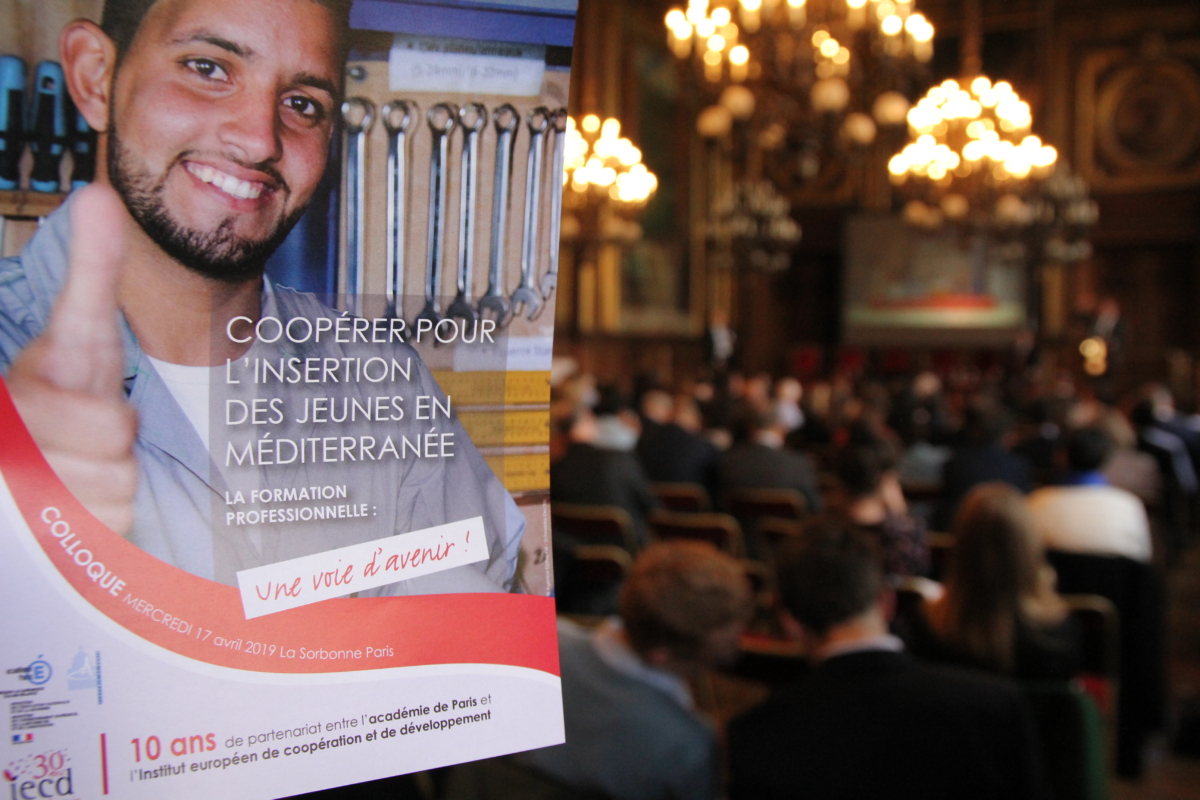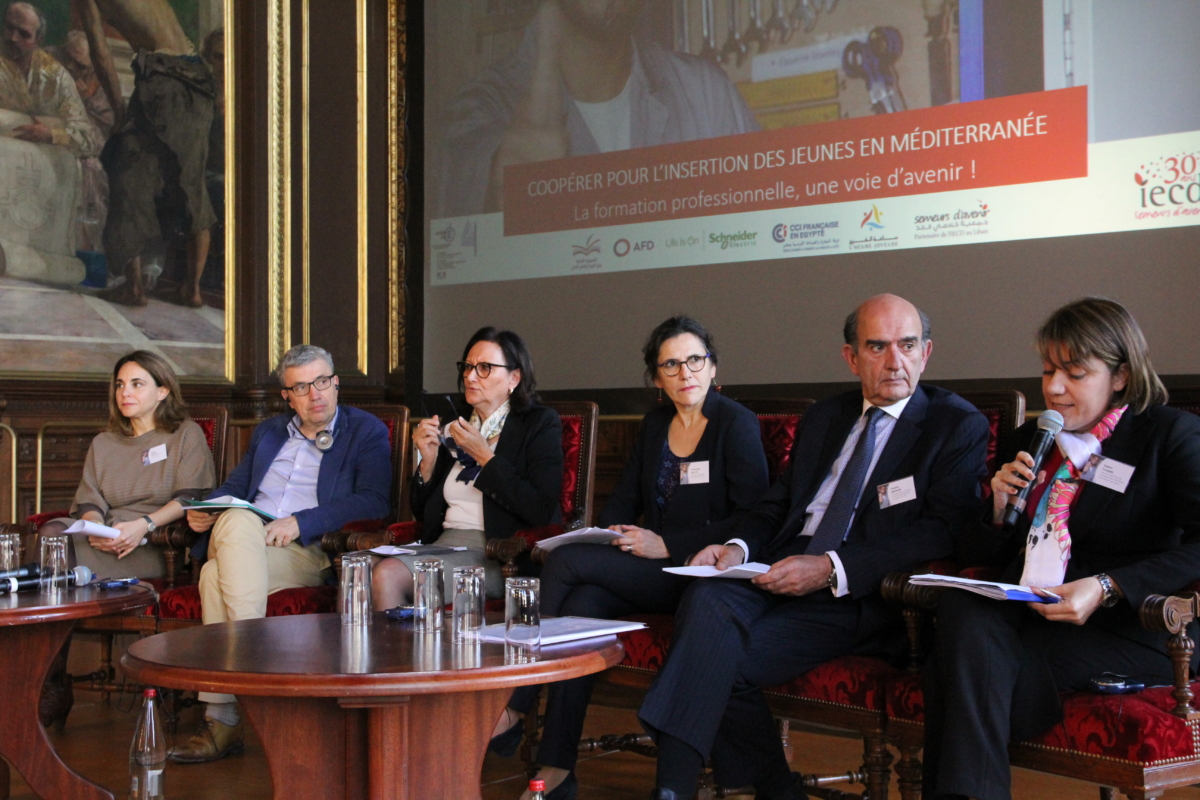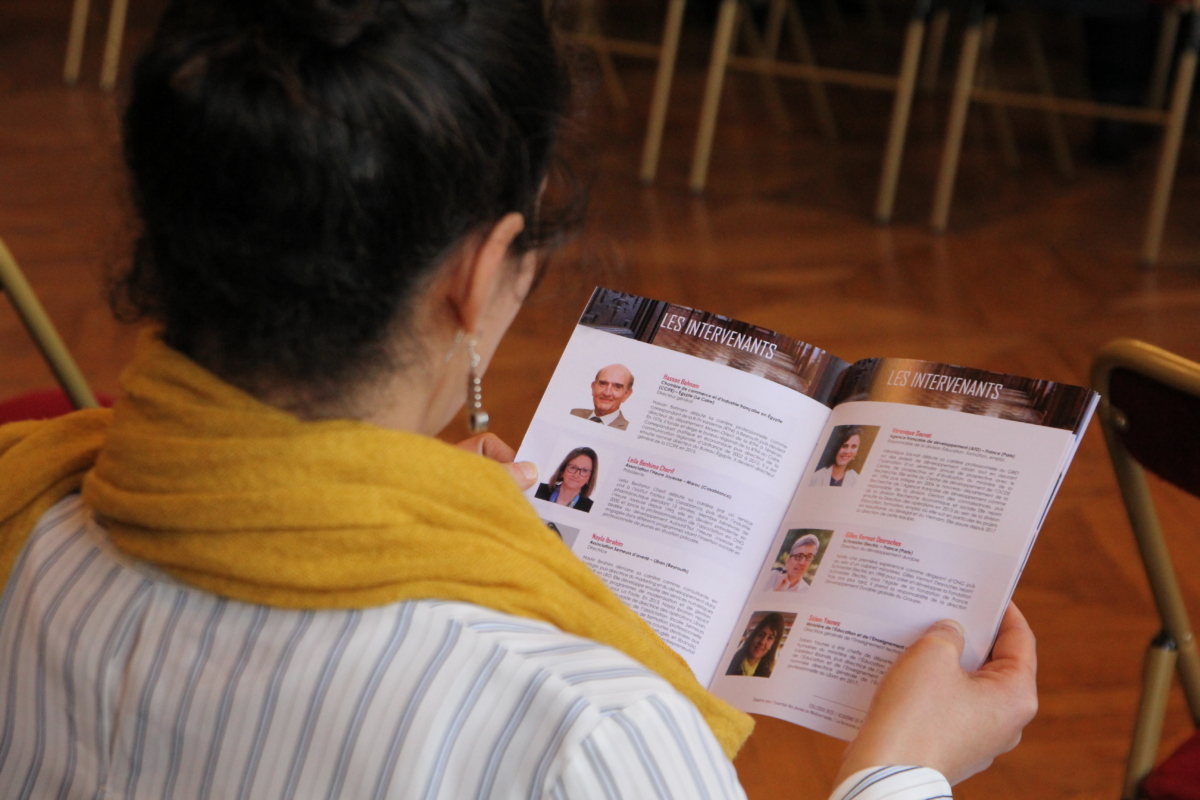VOCATIONAL TRAINING: A SOLUTION FOR THE FUTURE!
A conference to promote cooperation for the social and professional integration of young Mediterraneans
According to the WTO, unemployment rates are about 30% in North African countries, and the cost of youth unemployment among OECD member countries has reached $560 billion, namely the equivalent of 1% of the countries’ wealth. Mediterranean countries are facing similar problems and it is only in a cooperative framework of exchanges between the two shores that effective and lasting solutions will see the light of day.
On 17 April, at the Grand Salon of the Sorbonne, the IECD and the Académie de Paris came together to promote the concrete training and professional integration actions implemented in the field, with a view to attracting the support of public authorities and the private sector. To address the subject, stakeholders from both sides of the Mediterranean (Egypt, Lebanon, Morocco, and France) recalled the opportunity which the professional integration of young people represents, and emphasized the need to unite all of the ecosystem’s players.
More than 120 people gathered together for the occasion: representatives of international organizations, ministries, enterprises, players in the field, and academic experts. The event was also a means of marking the 10 years of collaboration between the IECD and the Académie de Paris, and of thanking the partners who attended, loyal supporters of the IECD in its ambition to help young people to find decent and sustainable jobs. Among them: the French Development Agency (AFD), Schneider Electric, the French Chamber of Commerce and Industry in Egypt (CCIFE), the associations L’Heure Joyeuse in Morocco, and Semeurs d’Avenir in Lebanon.
TOWARDS HIGH-QUALITY VOCATIONAL TRAINING THANKS TO THE IMPLICATION OF ALL PLAYERS
The 10 years of collaboration between the IECD and the Académie de Paris have contributed to the deployment of high-quality programs that have returned thousands of young Mediterraneans to a positive training and employment context. These results confirm that when there is a match between training and the labor market young people are able to find jobs.
In Morocco, the Training Center for Apprentices (CFA) in Mkanssa – a center co-created by the IECD and the L’Heure Joyeuse association in 2014 – has greatly increased the placement rate of young people following an apprenticeship contract to reach 80% in 2018 thanks to the improvement of training content and the strengthening of relations between schools and companies.

Vocational training is greatly supported by companies, provided that it meets their needs. To achieve the standard of quality required, Salam Younes, General Director of Technical and Vocational Education of the Ministry of Education and Higher Education in Lebanon, recalls the benefits of international cooperation, “as much in terms of facilities and buildings (“hard” aspects) as the redesign of vocational and technical training programs (“soft” aspects)”.
It has to be said that, today, vocational training is still seen as a default option. This is the case in all Mediterranean countries:
“We have about 1 doctor for 3 patients, but just 1 nurse for 20 patients!”, explains Nayla Ibrahim, Director of the Semeurs d’Avenir association in Beirut. “This really reflects the mentality: all parents want their children to be engineers, doctors, or lawyers. Vocational training is not recognized in Lebanon despite the needs being there.”
In Egypt, Mr. Hassan Behnam, Director General of the French Chamber of Commerce and Industry, talks of the “strong State employee culture”, which continues to be omnipresent. Companies are more selective and are looking for qualified and trained young people so as to save on their production time. “
In order for technical professions to be viewed in a positive light once again, it is essential for the training provided to be of good qualify. Thus, thanks to the cooperation between the IECD, the Lebanese ministry, the Semeurs d’Avenir association, the technical training centers and the Académie de Paris, an electronics baccalaureate was created in Lebanon and has become a sector of excellence officially recognized by the State. The IECD has since been entrusted with the creation of two new vocational baccalaureates in buoyant sectors.
HOW TO MOVE UP A GEAR?
In view of the rise in the number of young people out of work on both sides of the Mediterranean, these initiatives alone, limited in their development by a lack of resources and political intermediaries, are insufficient in view of the scale of the problem.
Sowing good practices in the Mediterranean region
The good practices tested by the various organizations may be beneficial to other players facing the same problems. The pooling of resources helps to save time and money and is a source of innovation and visibility for operational players. This is the mission with which the New Chance Mediterranean network has been entrusted.
“The key role of networks such as the New Chance Mediterranean network should be highlighted in order to capitalize on and share experiences and appeal to public authorities and businesses so as to ensure the increase and permanence of the actions.”, explains Véronique Sauvat, Manager of the Education-Training-Employment Division of the French Development Agency.
Since 2018, the IECD has worked to revitalize and develop the network. A candidate at the Summit of the Two Shores, which will be held on 24 June in Marseille on the initiative of the French President Emmanuel Macron, the New Chance Mediterranean network hopes that measures will be taken in favor of the integration of young people in greatest difficulty.
Mobilizing all stakeholders
In order to meet the scale of the challenge, it is essential to raise awareness among public authorities and businesses:

VOCATIONAL TRAINING: A SOLUTION FOR THE FUTURE!
Nowadays, all training and professional integration stakeholders agree that technical professions are able to absorb a large part of employment needs and offer a real opportunity.
In order to respond to the shortage of technicians in buoyant sectors, it is essential to realign vocational training so as to meet the needs of businesses and public authorities. However, there are many obstacles and, in particular, the underfunding of programs, which explains the importance of the support provided by international organizations, such as the AFD. For the occasion, Véronique Sauvat confirmed the AFD’s support to operational stakeholders whose “initiatives reflect great innovations”.
Today, young Mediterraneans require the mobilization of many more public, private, local and non-governmental stakeholders in order to restore their vitality and that of our region.
THE IECD COMMITS TO YOUNG MEDITERRANEANS
- by developing the impact of the New Chance Mediterranean network on both sides of the Mediterranean
- by tripling the number of young people supported by the IECD in the Mediterranean by 2025 and doubling the number of countries in the Mediterranean in which the IECD intervenes.
We extend our warmest thanks to the Académie de Paris
for having hosted this conference and to all the speakers:
Mr. Jean-Michel Coignard
Director of the Académie de Paris, Director of the Departmental Services
of the French National Education Authority
ACADÉMIE DE PARIS
Mrs. Véronique Sauvat
Head of the Education-Training-Employment Division
FRENCH DEVELOPMENT AGENCY
Mrs Salam Younes
General Director of Technical and Vocational Education
MINISTRY OF EDUCATION AND HIGHER EDUCATION IN LEBANON
Mr. Gilles Vermot Desroches
Sustainable Development Director,
SCHNEIDER ELECTRIC
Mr. Hassan Behnam
Director General
FRENCH CHAMBER OF COMMERCE AND
INDUSTRY IN EGYPT.
Mrs. Leïla Benhima Cherif
President of the L’HEURE JOYEUSE ASSOCIATION IN MOROCCO
Mrs. Nayla Ibrahim
Director of the SEMEURS D’AVENIR ASSOCIATION IN LEBANON
Mr. Guillaume Maujean
Editor-in-Chief “Finance and Markets” with LES ECHOS











